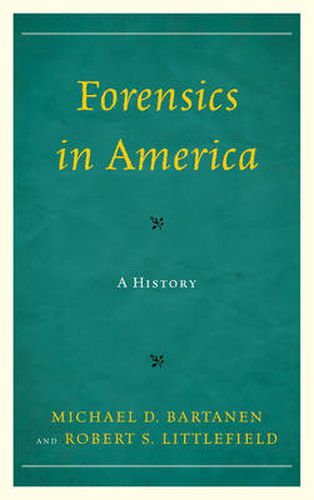Readings Newsletter
Become a Readings Member to make your shopping experience even easier.
Sign in or sign up for free!
You’re not far away from qualifying for FREE standard shipping within Australia
You’ve qualified for FREE standard shipping within Australia
The cart is loading…






This title is printed to order. This book may have been self-published. If so, we cannot guarantee the quality of the content. In the main most books will have gone through the editing process however some may not. We therefore suggest that you be aware of this before ordering this book. If in doubt check either the author or publisher’s details as we are unable to accept any returns unless they are faulty. Please contact us if you have any questions.
Here is the story of the process by which competitive speech and debate evolved in the United States during the 20th Century.
This authoritative history shows how forensics, as practiced in the United States, was an uneasy fusion of contradictory premises that began as a significant part of the tradition of American public address: The need for preparing students to participate in democratic governance in conflict with a student’s need to express personal and competitive impulses. Forensics represented a push and pull between an activity simultaneously considered to be both a public and a private good.
The book: *identifies the themes and trends of American forensics within an overarching chronological framework;
*reveals the impact of American forensics on the communication discipline, as well as America’s social and educational systems;
*concentrates on the elements of social history that contributed to organizational development, leadership, and politics; and, * provides a base line reflecting the influences of both American culture in particular, and western culture in general, for cross-cultural comparisons between processes and effects of forensics as a form of education.
While intrinsically valuable as part of a comprehensive understanding of the history of higher education in the United States in the 20th Century, Forensics in America: A History is significant in providing a context for understanding the role forensics may play in the 21st Century. The book expands the study of American public address, focuses on the pedagogy of forensics training, and explores cultural dimensions of forensics activities.
$9.00 standard shipping within Australia
FREE standard shipping within Australia for orders over $100.00
Express & International shipping calculated at checkout
This title is printed to order. This book may have been self-published. If so, we cannot guarantee the quality of the content. In the main most books will have gone through the editing process however some may not. We therefore suggest that you be aware of this before ordering this book. If in doubt check either the author or publisher’s details as we are unable to accept any returns unless they are faulty. Please contact us if you have any questions.
Here is the story of the process by which competitive speech and debate evolved in the United States during the 20th Century.
This authoritative history shows how forensics, as practiced in the United States, was an uneasy fusion of contradictory premises that began as a significant part of the tradition of American public address: The need for preparing students to participate in democratic governance in conflict with a student’s need to express personal and competitive impulses. Forensics represented a push and pull between an activity simultaneously considered to be both a public and a private good.
The book: *identifies the themes and trends of American forensics within an overarching chronological framework;
*reveals the impact of American forensics on the communication discipline, as well as America’s social and educational systems;
*concentrates on the elements of social history that contributed to organizational development, leadership, and politics; and, * provides a base line reflecting the influences of both American culture in particular, and western culture in general, for cross-cultural comparisons between processes and effects of forensics as a form of education.
While intrinsically valuable as part of a comprehensive understanding of the history of higher education in the United States in the 20th Century, Forensics in America: A History is significant in providing a context for understanding the role forensics may play in the 21st Century. The book expands the study of American public address, focuses on the pedagogy of forensics training, and explores cultural dimensions of forensics activities.